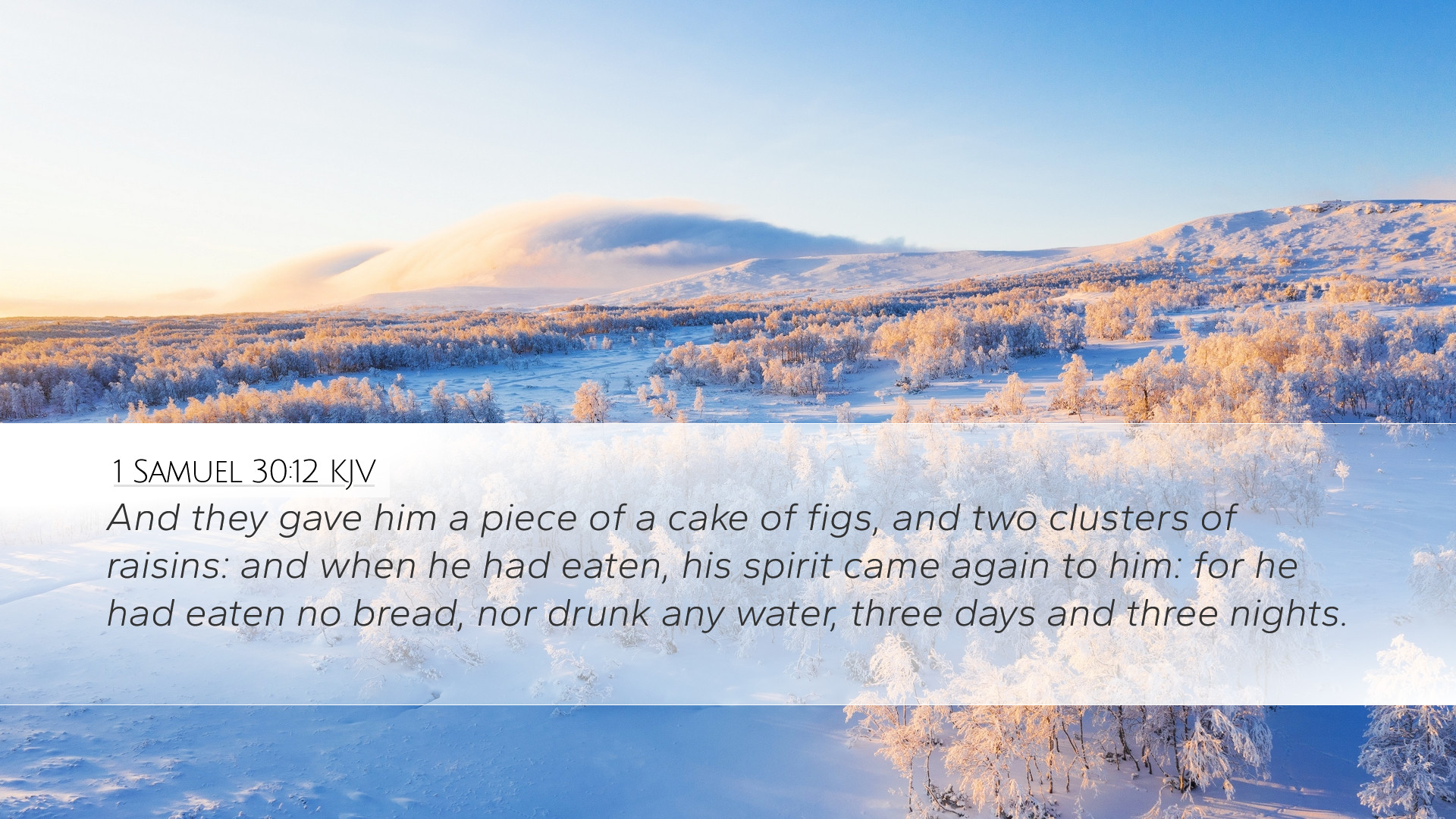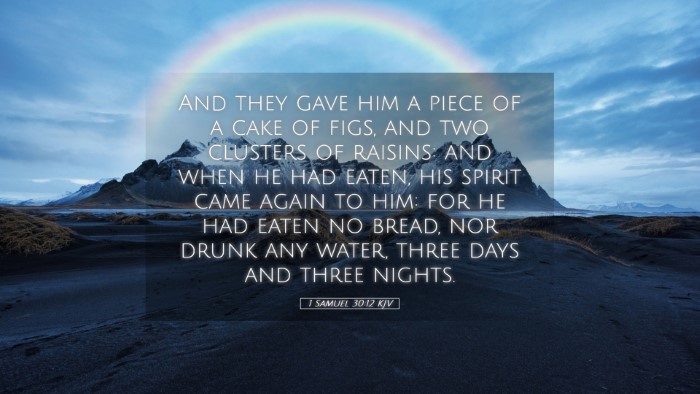Commentary on 1 Samuel 30:12
Verse Context: 1 Samuel 30:12 states: “And they gave him a piece of a cake of figs, and two clusters of raisins: and when he had eaten, his spirit came again to him: for he had eaten no bread, nor drunk any water three days and three nights.” This verse occurs in a narrative set amidst the distressing events surrounding David’s plight at Ziklag.
Overview of the Situation
David and his men return to Ziklag, only to find their city destroyed by the Amalekites and their families taken captive. In their despair, a revelation of grace appears as they encounter an Egyptian servant who provides critical information about the Amalekites.
Importance of This Verse
This verse highlights the themes of restoration and divine providence amidst human suffering. It also emphasizes the importance of physical sustenance and its effect on spiritual fortitude.
Insights from Matthew Henry
Matthew Henry notes the significance of the refreshment given to the Egyptian servant, interpreting it as a symbol of the compassion that should be exercised towards those who are cast down. He draws attention to how even in dire circumstances, God provides for His people. Henry emphasizes that in David’s time of need, God utilized the simplest provisions—a piece of cake and raisins—to revive the spirit of the weary man.
- Compassion in Need: Henry stresses the importance of being attentive to the needs of others, suggesting that even during our trials, we can be sources of comfort.
- Reviving the Spirit: The act of providing food illustrates that physical sustenance is essential for revival, echoing the idea that the physical and spiritual are inextricably linked.
Insights from Albert Barnes
Albert Barnes elaborates on the actions of David and his men in their assistance to the dying Egyptian. He highlights the principle of mercy found in this narrative when examining the nature of leadership during crisis. Barnes also comments on the metaphorical implications of the fig cake and raisins, promoting the understanding that God often works through the ordinary to accomplish His extraordinary purposes.
- Charity and Mercy: Barnes illustrates that the display of mercy to the Egyptians represents a higher moral ground amidst conflict, challenging leaders to embrace compassion even when faced with adversity.
- Symbolism of Food: The simple offerings symbolize not only sustenance but also the restoration of hope when all seems lost, reflecting on the nature of God’s provision during our spiritual crises.
Insights from Adam Clarke
Adam Clarke focuses on the practical aspects of the narrative, analyzing the physiological and psychological implications of the nourishment provided to the Egyptian. He points out that after three days without sustenance, receiving food would not only revive his body but also invigorate his spirit, thus drawing a parallel to the believer’s need for spiritual nourishment through God’s word.
- Physical vs. Spiritual Nourishment: Clarke emphasizes that just as the body requires food to function, so does the soul require spiritual sustenance through Scripture and prayer, which is critical for recovery during times of distress.
- Divine Timing: Clarke notes that the timing of their encounter with the Egyptian servant demonstrates God’s providential care, as it occurs precisely when David needs guidance to rescue his family.
Theological Reflections
This verse serves as a confluence of pastoral care, theological reflection, and practical application. It invites pastors and scholars to consider how God employs ordinary occurrences and relationships to manifest His divine purpose.
- God's Providence: Reflecting on the providential hand of God, we are reminded that divine assistance may come in unexpected forms, suggesting that believers must maintain a posture of openness to His leading.
- Role of Community: The act of sharing food amongst distressed individuals emphasizes the strength found in community support; when one member is weak, others are called to uplift and restore.
Conclusion
1 Samuel 30:12 encapsulates critical theological truths regarding the nature of God’s care and the human experience of suffering. As pastors and scholars reflect on this narrative, they may draw connections to how the Lord continues to provide both physical and spiritual sustenance in times of need. Modern believers can take heed of the lessons found in this passage, reinforcing the importance of community, compassion, and divine providence in their lives.


